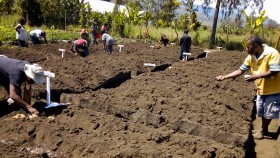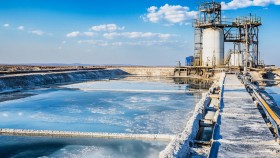Global warming of 1.5C: Will you listen please?
25 October 2018
On October 8th, the Intergovernmental Panel on Climate Change published their Report on Global Warming of 1.5oC. The findings have enormous implications for our society – the report highlights the need for urgent action if we want to keep climate change within safe limits and reduce extreme weather events, heat-related morbidity and food shortages.
But how do we ensure that people are actually understanding the implications and taking action accordingly?
At 866 pages, based on more than 6,000 research papers (equivalent to a four storey building if they were all stacked on top of each other) the scale, depth and breadth of the report can be daunting. Even the Summary for policy makers runs to 33 pages. The three page Headline statements are certainly shorter - but are there other ways to get the message across?
Since the launch of the report, scientists, journalists and commentators have all been exploring the best ways to effectively communicate its findings in an increasingly noisy and crowded world.
“I've tried to condense the message down to its absolute essence," says Prof Mark Howden, IPCC Vice Chair, Review Editor of the report and Director of the ANU Climate Change Institute, "and here it is:
Every half a degree matters, every year matters, every choice matters.
Or a longer version:
Every half a degree matters, with unwanted climate change impacts. The Carbon budget for a two thirds chance to stay below 1.5C will be gone in 10 to 14 years. So every year matters. Many options are laid out in the report with differing implications. So every choice matters.”
And we thought this Haiku (a traditional Japanese poem of 17 syllables), written by IPCC Vice Chair and Contributing Author, Andy Reisinger, was powerful in its simplicity and worth highlighting as a great way of communicating the key messages of the report. Here's the first verse:
We wrote this report
at your request, and with care.
Will you listen please?
It's well worth reading the full haiku (of 19 verses including references to relevant sections of the report) here. Or here are the 19 verses on their own:
We're at 1 degree
now and will hit 1.5
within three decades.
Past emissions will
warm the Earth for centuries -
but there's still a choice.
Climate risk increase
with every half degree.
Some are real now.
More warming, higher
seas. Maybe much higher. Could
wake sleeping giants.
Warming is bad news
for many species. Once gone,
we can't bring them back.
People are affected
by all this; some will struggle
much more than others.
1.5 degrees
needs global carbon-zero
by 2050.
All emission paths
to 1.5 degrees cut
methane hard and fast.
Carbon budgets are
uncertain but either way
quickly depleted.
Reduced emissions
won't be enough. Put carbon
back where it belongs.
Feed more people and
remove carbon at large scale -
in models yes, but...?
Current NDCs
across countries won't achieve
what we agreed to.
Rapid reductions
demand unprecedented
transformations now.
1.5 degrees
needs higher carbon prices
to make it happen.
Policies can drive
investment, innovation,
and behaviour change.
There are so many
synergies with SDGs:
Use them or lose them.
Adapt, mitigate
and develop: with great care
we could have it all.
Good development
helps climate, and good climate
helps development.
The length of these different forms of communication vary by a factor of over 43,000. Each form of communication has its place; the full report is powerful beause of its incredible rigour and depth whilst the brevity of Prof Mark Howden's quote and the Haiku can help make the report's findings easily comprehensible and more emotionally engaging. So finally, again “Will you listen please …?”
About the Haiku author
Andy Reisinger is Deputy Director of the New Zealand Agricultural Greenhouse Gas Research Centre, Vice-Chair of Working Group III of the Intergovernmental Panel on Climate Change (IPCC) and Contributing Author to the Special Report on 1.5 °C Global Warming.
Updated: 14 October 2019/Responsible Officer: College of Science/Page Contact: https://iceds.anu.edu.au/contact
















